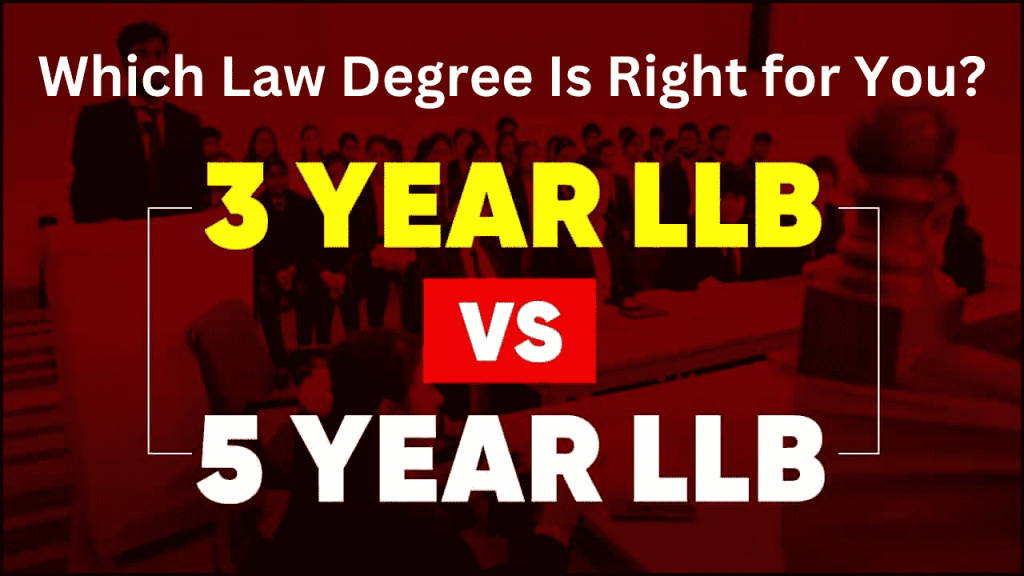
Deciding to study law is an exciting step toward a rewarding career. But many students face a crucial choice right at the beginning: should you pursue a 3-year LLB or a 5-year integrated LLB program? Both paths lead to becoming a lawyer, but they differ in significant ways that could impact your educational journey and career prospects.
This article breaks down the key differences between these two law programs to help you make the best choice for your future.
Understanding the Basics
What is a 3-Year LLB Program?
The 3-year LLB is the traditional law degree designed for students who have already completed an undergraduate degree in any field. This program focuses entirely on legal education, diving straight into law subjects without covering other academic areas.
Key features:
- Who can apply: Graduates with a bachelor’s degree in any subject
- Duration: 3 years (six semesters)
- Focus: Purely law subjects like constitutional law, criminal law, and contract law
- Annual fees: Generally between Rs.50,000 to Rs.2,00,000
What is a 5-Year Integrated LLB Program?
The 5-year program combines an undergraduate degree with legal education. Common variations include BA LLB (Arts + Law), BBA LLB (Business + Law), and B.Sc. LLB (Science + Law). This integrated approach allows students to start their legal education immediately after high school.
Key features:
- Who can apply: Students who have completed 12th grade (usually with at least 50% marks)
- Duration: 5 years (ten semesters)
- Focus: Combination of general education subjects plus law subjects
- Annual fees: Generally between Rs.1,00,000 to Rs.5,00,000
Major Differences Between the Programs
1. Entry Point and Eligibility
The most obvious difference is when you can start each program:
- 3-Year LLB: You need to complete a bachelor’s degree first (taking 3-4 years), then apply for the LLB program. This means your total education time will be 6-7 years.
- 5-Year LLB: You can join directly after finishing 12th grade, completing your entire education in just 5 years.
This difference makes the 5-year program potentially more time-efficient for students who know early on that they want to pursue law.
2. Educational Approach
The programs differ significantly in what and how you learn:
- 3-Year LLB: Laser-focused on law subjects from day one. You’ll spend all your time studying legal principles, cases, and procedures.
- 5-Year LLB: Offers a broader education, especially in the first 2-3 years. You’ll study subjects like political science, sociology, economics, or business alongside your law courses. This provides a more well-rounded foundation.
3. Career Flexibility
Your choice can impact your career options:
- 3-Year LLB: Best for those who already have specialized knowledge in another field and want to add legal expertise. For example, an engineer who completes a 3-year LLB could excel in intellectual property law or a commerce graduate might thrive in corporate law.
- 5-Year LLB: Provides dual qualifications that can open doors in various sectors. The background in arts, business, or science combined with legal knowledge can be valuable in specialized fields or non-traditional legal careers.
4. Cost Considerations
When thinking about the total cost of your education:
- 3-Year LLB: Generally has lower annual fees, but when combined with your previous degree, the total educational cost may be higher.
- 5-Year LLB: Usually has higher annual fees, but may be more cost-effective overall since it combines two degrees into one program.
5. Learning Experience
The student experience differs between programs:
- 3-Year LLB: Classes often include students from diverse educational backgrounds and age groups, creating a rich learning environment with varied perspectives.
- 5-Year LLB: Students typically progress through the entire program together, building stronger peer relationships and a more consistent learning community.
Which Program Should You Choose?
Consider the 3-Year LLB if:
- You’ve already completed a bachelor’s degree in another field
- You discovered your interest in law later in your educational journey
- You want to combine your existing expertise with legal knowledge
- You prefer a focused, intensive law education without general subjects
- You’re looking for a quicker route to complete your legal education
Consider the 5-Year Integrated LLB if:
- You’re certain about pursuing law right after high school
- You want a broader educational foundation that includes other disciplines
- You value the efficiency of completing both degrees in 5 years instead of 6-7
- You’re interested in developing deeper connections with your law school peers
- You prefer a more gradual introduction to legal studies through a building-block approach
Real-World Perspective
Both programs have produced successful lawyers, judges, and legal professionals. Neither option limits your ability to practice law or take the bar exam.
Many legal experts suggest that the choice ultimately comes down to your personal circumstances:
- If you’re a high school graduate certain about law as your career, the 5-year program offers a direct path.
- If you’re a graduate looking to pivot to law or enhance your existing career with legal knowledge, the 3-year program is ideal.
Financial Considerations
Beyond the annual fees, consider these financial aspects:
- Opportunity cost: The 5-year program might allow you to enter the workforce 1-2 years earlier than completing a separate bachelor’s degree and then a 3-year LLB.
- Living expenses: A longer education period means more years of accommodation, transportation, and daily living costs.
- Scholarship opportunities: Some institutions offer different scholarship options for each program type.
Final Thoughts
Both the 3-year and 5-year LLB programs have their unique strengths. The best choice depends on your educational background, career goals, financial situation, and personal preferences.
Remember that the quality of the institution often matters more than the program duration. Research law schools thoroughly, looking at their faculty expertise, placement records, infrastructure, and alumni network.